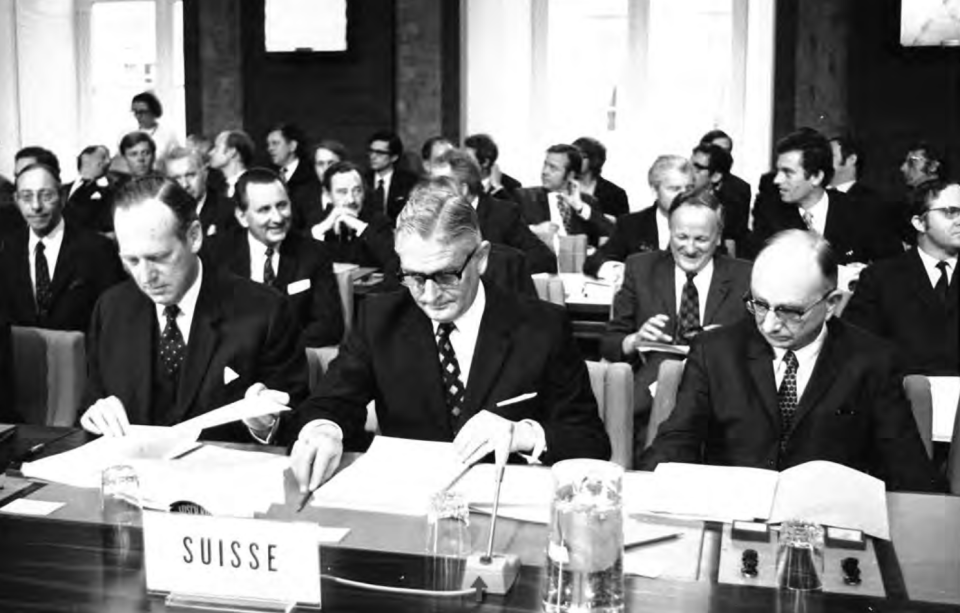The free trade agreement with the EEC
For the editorial staff of «Weltwoche», in 1972 it was a «historical landmark» whose significance could be compared to the Federal Charter of 1291, to the Battle of Marignano, to the Peace of Westphalia, the Congress of Vienna, and to the foundation of the Federal State in 1848 (dodis.ch/36211). What this Zurich weekly, fresh from the press, took to the hall of glory of Swiss history was the free trade agreement with the European Economic Union (EEC), signed in Brussels 50 years ago, on 22nd of July, 1972, by Federal Councillor Ernst Brugger on behalf of Switzerland. This was «a decisive step in the context of our traditional efforts to contribute to the integration of our continent, as far as we can while maintaining direct democracy, the parliamentary rights, and neutral foreign policy», Brugger underlined during his speech (dodis.ch/36209).
«Special relations» of the EEC with the «non-candidates »
«When in 1969 France dropped her veto against British membership, the way for a first round of EEC extension was clear», says Sacha Zala, Director of the Dodis research centre. Parallel to the accession talks with the United Kingdom as well as with Denmark, Ireland and Norway, Brussel also negotiated the «establishment of special relations» with the «non-candidates», the EFTA countries Finland, Iceland, Austria, Portugal, Sweden, and Switzerland (dodis.ch/36161). Any economic fragmentation of Western Europe had to be avoided, but how much these states were supposed to contribute to the project of European integration was still an open question when the explorative talks were started. For the Swiss negotiators, the «range of possible solutions with the EEC» went from «a solution close to joining» as far as to a «common trade agreement» (dodis.ch/36157).
Institutional contribution by Switzerland?
In his opening statement in Brussels on November, 1970, Federal Councillor Brugger emphasized the already «high degree of economic interpenetration between Switzerland and the European Communities», particularly when it came to the exchange of goods, where the 75% of Swiss imports and 60% of exports were «unsurpassed by any other third country» (dodis.ch/36161). Brugger’s chief negotiator, the Director of the trade division of the Department of Economic Affairs, Paul Jolles, knew that both Switzerland and the European Community (EC) were breaking new ground. «The querying of suitable, novel modalities of cooperation requires creative imaginativeness and, accordingly, needs time», Ambassador Jolles expressed his task which was still to be solved even 50 years later: «The most difficult problem will doubtlessly be the shaping of Switzerland’s institutional contribution to the integration process.» (dodis.ch/35774)
The results of the agreement
After all, a comprehensive institutional solution could not be achieved. On 22 of July, 1972, Federal Councillor Brugger signed an agreement which «did not provide for any participation in Europe’s political integration». On the other hand, the treaty exempted more than 90% of Swiss exports to the EEC, in particular industrial products, from existing duties and fixed rules of competition (dodis.ch/36210). One prerequisite of the EEC was «a solution for the delicate ‹Swiss made› problem» which, concerning the products of the watchmaking industry, could be tied up two days before in the context of the agreement (dodis.ch/35586). Indeed, any «solution for the second generation problems (such as currency policy, energy policy, environmental policy, transport policy)» was left out, as chief negotiator Jolles summed it up. Yet still, for the first time it was possible to «establish a long-term relation including consultation possibilities» with the EEC (dodis.ch/34608).
«Irreversible development in the direction of Europe»
During the negotiations, Switzerland had intensively operated with the argument of the agreement being threatened with being rejected by the referendum, thus exerting pressure on the EEC. However, when finally the Federal Council made the free trade agreement subject to the obligatory referendum, this was not just to keep face towards the outside. «By way of this treaty, also our cooperation with Europe will be consolidated in the long run», Minister of Economic Affairs Brugger had it during his statement to the Federal Council, «and nevertheless we tie ourselves economically – if ‹only› by way of a free trade agreement – to a community of more than 300 million inhabitants». «For practical reasons» Switzerland «would probably never contemplate» any termination of the agreement. Minister of Home Affairs Hans-Peter Tschudi doubled «that the treaty with the EEC starts a development of our country in the direction of Europe which is mostly irreversible». (dodis.ch/35778)
The people’s rights and foreign policy
The referendum on the free trade agreement also marked the beginning of the intended extension of the people’s rights in the course of a reform of the state treaty referendum. Increasingly, foreign political decisions required the sovereign’s agreement. Thus, as early as at the beginning of the negotiations the Federal Council had decided to, by way of an increased communications policy, create «an atmosphere of interest, of open-mindedness and understanding among the broad masses for the great issues which concern the fate of our country» – «not as propaganda but basically as a didactic effort» (dodis.ch/35368). Juicy in this context, however, is a note by the Integration Office in charge of the relations with Brussels, titled «What should not be said when telling the people about the Switzerland-EEC agreement» (dodis.ch/36230).
Finally, both the people and the Cantons agreed with the free trade agreement on 3rd of December, 1972, with 72.5 % affirmative votes. «Never since has the Federal Council’s European policy been given such a broad legitimation» is the conclusion by Dodis Director Zala. «Any further integration of Switzerland was prevented by the people by the referendum on the EEA agreement of December, 1992.»
